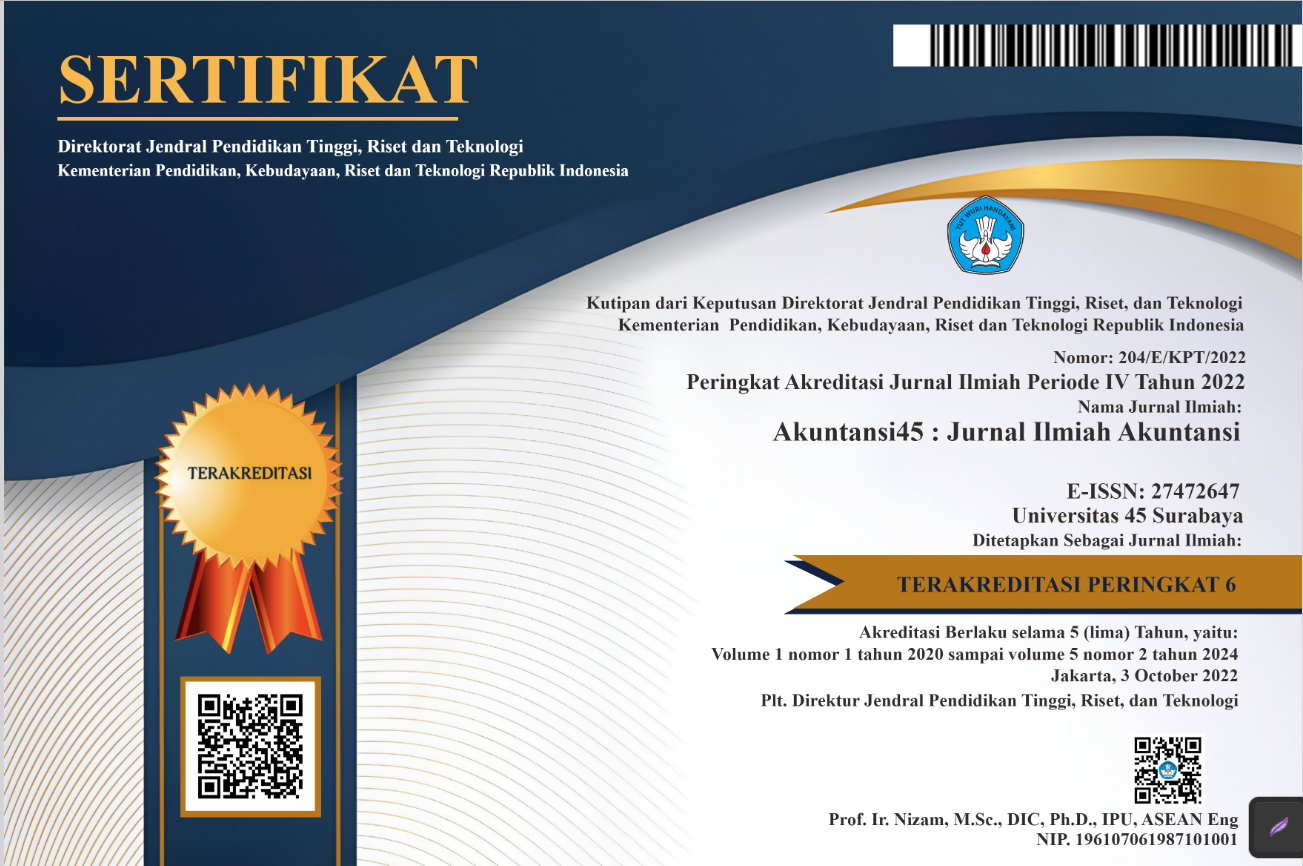Penentu Kinerja Keuangan Perusahaan Manufaktur di Indonesia Dengan GCG Sebagai Moderasi
DOI:
https://doi.org/10.30640/akuntansi45.v6i1.4213Keywords:
Return On Asset, Return On Equity, PROPER, Post-employment benefits, Debt to Total AssetAbstract
This study aimed to analyze the effect of environmental performance, postemployment benefits, and leverage on financial performance moderated by GCG in consumer goods manufacturing companies. The independent variables in this study used environmental performance as measured by PROPERS’s score, postemployment benefits as measured by comparison of the post-employment benefits payable to overall debt, and leverage as measured by two indicators, that are Debt to Total Assets Ratio (DAR) and Debt to Total Equity Ratio (DER). For the dependent variable, financial performance are measured using the Return on Assets (ROA) and Return on Equity (ROE) indicators. GCG as moderating variable is measured by the number of commissioners. The population of this study is consumer goods sub-sector manufacturing companies which listed on IDX adnd as PROPER participants in 2018-2020. Data were collected by using purposive sampling, so there are 73 observations data were processed using SEM PLS analysis. The result of this study show that environmental performance has a positive and significant effect on financial performance. Post-employment benefits has a negative and significant effect on financial performance. Leverage has a negative and significant performance and GCG doesn’t moderate the relationship between leverage and financial performance.
References
Al Farooque, O., Buachoom, W., & Sun, L. (2019). Board, audit committee, ownership and financial performance – Emerging trends from Thailand. Pacific Accounting Review, 32(1), 54–81. https://doi.org/10.1108/PAR-10-2018-0079
Azmy, A., Anggreini, D. R., & Hamim, M. (2019). Effect of good corporate governance on company profitability RE & property sector in Indonesia. Jurnal Akuntansi, 23(1), 17. https://doi.org/10.24912/ja.v23i1.457
Dalci, I. (2018). Impact of financial leverage on profitability of listed manufacturing firms in China. Pacific Accounting Review, 30(4), 410–432. https://doi.org/10.1108/PAR-01-2018-0008
Effendi, A. (2016). The power of good corporate governance: Teori dan implementasi (6th ed.). Jakarta: Salemba Empat.
Effendi, S. (2019). The effect of disclosure of corporate social responsibility and good corporate governance to ROA in Sri Kehati Index. In Proceedings of the AICMaR 2018, 74, 79–82. https://doi.org/10.2991/aicmar-18.2019.18
Ermaya, H. N. L., & Mashuri, A. A. S. (2020). The influence of environmental performance, environmental cost and ISO 14001 on financial performance in non-financial companies listed on the Indonesia Stock Exchange. Neraca: Jurnal Akuntansi Terapan, 1(2), 74–83. https://doi.org/10.31334/neraca.v1i2.857
Gathara, Z. M., Kilika, J. M., & Maingi, J. N. (2019). Effect of leverage on financial performance of selected companies listed in Nairobi Securities Exchange, Kenya. International Journal of Innovation and Financial Economics Research, 7(1), 10–33.
Hartono, J. (2015). Metodologi penelitian bisnis (6th ed.). Jogjakarta: BPFE.
Iriyadi, I., Tartilla, N., & Gusdiani, R. (2019). The effect of tax planning and use of assets on profitability with good corporate governance as a moderating variable. In Proceedings of ISBEST 2019, 143, 220–227. https://doi.org/10.2991/aebmr.k.200522.043
Ivo, M. S., & Anyanwaokoro, M. (2019). Relating financial leverage to corporate performance: A case of cement manufacturing firms in Nigeria. South Asian Journal of Social Studies and Economics, 3(4), 1–14. https://doi.org/10.9734/sajsse/2019/v3i430114
Latan, H., & Ghozali, I. (2013). Partial least square: Konsep, teknik, dan aplikasi menggunakan program SMART PLS. Semarang: Penerbit Universitas Diponegoro.
Mayliza, R., Dewi, A. S., & Sari, L. F. (2019). The influence of good corporate governance towards financial performance using earnings management as the intervening variable at banking companies listed in Indonesia’s stock exchange. KnE Social Sciences, 3(14), 472. https://doi.org/10.18502/kss.v3i14.4332
Murhadi, W. R. (2013). Analisis laporan keuangan, proyeksi dan valuasi saham. Jakarta: Salemba Empat.
Nawangsari, R. D., & Nugroho, P. I. (2019). Pengaruh indikator kinerja ekonomi, indikator kinerja lingkungan dan indikator kinerja sosial terhadap profitabilitas perusahaan manufaktur. International Journal of Social Science and Business, 3(2), 162. https://doi.org/10.23887/ijssb.v3i2.17644
Nofianti, N., Uzliawati, L., & Sarka, S. (2015). Pengaruh corporate governance terhadap environmental disclosure dengan environmental performance sebagai variabel moderating. Trikonomika, 14(1), 38. https://doi.org/10.23969/trikonomika.v14i1.590
Rahmah, P. A., & Iramani, R. R. (2015). Pengaruh kinerja keuangan dan corporate social responsibility terhadap nilai perusahaan pada bank. Journal of Business and Banking, 5(2), 195–212. https://doi.org/10.14414/jbb.v5i2.547
Safri, S. (2013). Analisis kritis atas laporan keuangan. Jakarta: Raja Grafindo Persada.
Selcuk, E. A. (2019). Corporate social responsibility and financial performance: The moderating role of ownership concentration in Turkey. Finance Research Letters. https://doi.org/10.1016/j.frl.2019.101370
Setyono, J. (2016). Pengaruh kebijakan sosial dan kinerja lingkungan terhadap kinerja keuangan perusahaan manufaktur go public di Bursa Efek Indonesia. Journal of Business and Banking, 5(2), 183. https://doi.org/10.14414/jbb.v5i2.702
Usman, M., & Iqbal, U. (2018). Impact of financial leverage on firm performance textile composite companies of Pakistan: Literature review. Seisense Journal of Management, 1(2), 71–78. https://doi.org/10.5281/zenodo.1241454
Veno, A. (2015). Pengaruh corporate governance terhadap kinerja perusahaan manufaktur. Jurnal Manajemen dan Bisnis, 19(1), 95–112. https://doi.org/10.20473/jeba.v28i12018.57-73
Widhiastuti, N. L. P., Suputra, I. D. G. D., & Budiasih, I. G. A. N. (2017). Pengaruh kinerja lingkungan pada kinerja keuangan dengan corporate social responsibility sebagai variabel intervening. E-Jurnal Ekonomi dan Bisnis Universitas Udayana, 6(2), 819–846.
Downloads
Published
How to Cite
Issue
Section
License
Copyright (c) 2025 AKUNTANSI 45

This work is licensed under a Creative Commons Attribution-ShareAlike 4.0 International License.









